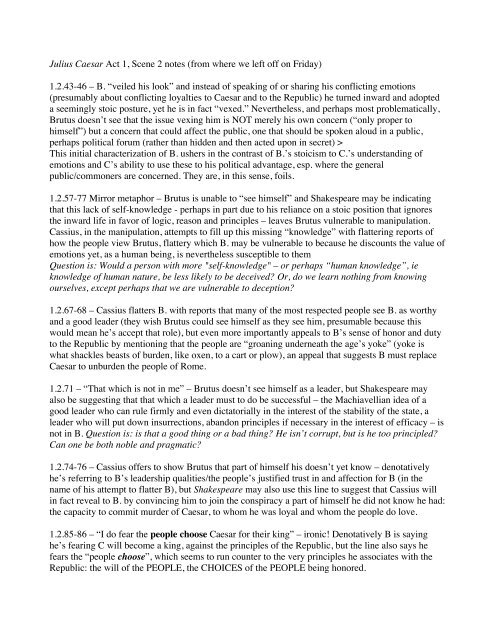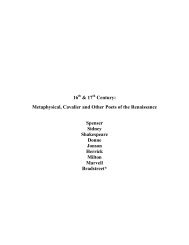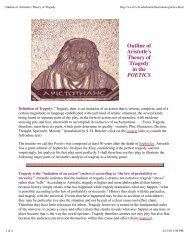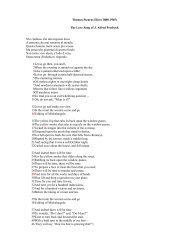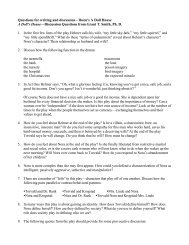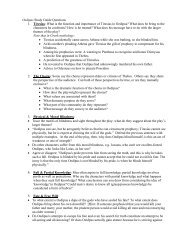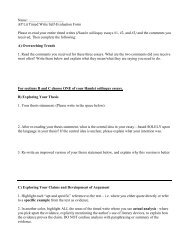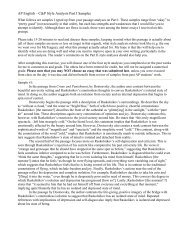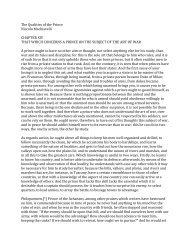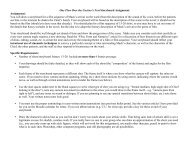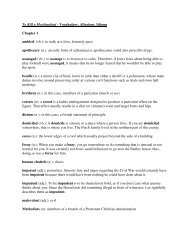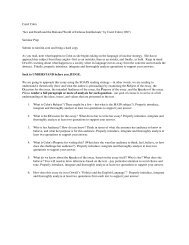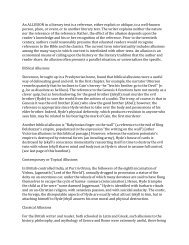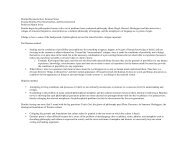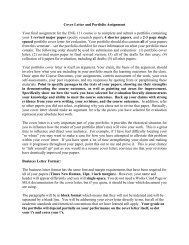Julius Caesar Act 1, Scene 2 notes (from where we left off on Friday ...
Julius Caesar Act 1, Scene 2 notes (from where we left off on Friday ...
Julius Caesar Act 1, Scene 2 notes (from where we left off on Friday ...
Create successful ePaper yourself
Turn your PDF publications into a flip-book with our unique Google optimized e-Paper software.
<str<strong>on</strong>g>Julius</str<strong>on</strong>g> <str<strong>on</strong>g>Caesar</str<strong>on</strong>g> <str<strong>on</strong>g>Act</str<strong>on</strong>g> 1, <str<strong>on</strong>g>Scene</str<strong>on</strong>g> 2 <str<strong>on</strong>g>notes</str<strong>on</strong>g> (<str<strong>on</strong>g>from</str<strong>on</strong>g> <str<strong>on</strong>g>where</str<strong>on</strong>g> <str<strong>on</strong>g>we</str<strong>on</strong>g> <str<strong>on</strong>g>left</str<strong>on</strong>g> <str<strong>on</strong>g>off</str<strong>on</strong>g> <strong>on</strong> <strong>Friday</strong>)1.2.43-46 – B. “veiled his look” and instead of speaking of or sharing his c<strong>on</strong>flicting emoti<strong>on</strong>s(presumably about c<strong>on</strong>flicting loyalties to <str<strong>on</strong>g>Caesar</str<strong>on</strong>g> and to the Republic) he turned inward and adopteda seemingly stoic posture, yet he is in fact “vexed.” Nevertheless, and perhaps most problematically,Brutus doesn’t see that the issue vexing him is NOT merely his own c<strong>on</strong>cern (“<strong>on</strong>ly proper tohimself”) but a c<strong>on</strong>cern that could affect the public, <strong>on</strong>e that should be spoken aloud in a public,perhaps political forum (rather than hidden and then acted up<strong>on</strong> in secret) >This initial characterizati<strong>on</strong> of B. ushers in the c<strong>on</strong>trast of B.’s stoicism to C.’s understanding ofemoti<strong>on</strong>s and C’s ability to use these to his political advantage, esp. <str<strong>on</strong>g>where</str<strong>on</strong>g> the generalpublic/comm<strong>on</strong>ers are c<strong>on</strong>cerned. They are, in this sense, foils.1.2.57-77 Mirror metaphor – Brutus is unable to “see himself” and Shakespeare may be indicatingthat this lack of self-knowledge - perhaps in part due to his reliance <strong>on</strong> a stoic positi<strong>on</strong> that ignoresthe inward life in favor of logic, reas<strong>on</strong> and principles – leaves Brutus vulnerable to manipulati<strong>on</strong>.Cassius, in the manipulati<strong>on</strong>, attempts to fill up this missing “knowledge” with flattering reports ofhow the people view Brutus, flattery which B. may be vulnerable to because he discounts the value ofemoti<strong>on</strong>s yet, as a human being, is nevertheless susceptible to themQuesti<strong>on</strong> is: Would a pers<strong>on</strong> with more "self-knowledge" – or perhaps “human knowledge”, ieknowledge of human nature, be less likely to be deceived? Or, do <str<strong>on</strong>g>we</str<strong>on</strong>g> learn nothing <str<strong>on</strong>g>from</str<strong>on</strong>g> knowingourselves, except perhaps that <str<strong>on</strong>g>we</str<strong>on</strong>g> are vulnerable to decepti<strong>on</strong>?1.2.67-68 – Cassius flatters B. with reports that many of the most respected people see B. as worthyand a good leader (they wish Brutus could see himself as they see him, presumable because thiswould mean he’s accept that role), but even more importantly appeals to B’s sense of h<strong>on</strong>or and dutyto the Republic by menti<strong>on</strong>ing that the people are “groaning underneath the age’s yoke” (yoke iswhat shackles beasts of burden, like oxen, to a cart or plow), an appeal that suggests B must replace<str<strong>on</strong>g>Caesar</str<strong>on</strong>g> to unburden the people of Rome.1.2.71 – “That which is not in me” – Brutus doesn’t see himself as a leader, but Shakespeare mayalso be suggesting that that which a leader must to do be successful – the Machiavellian idea of agood leader who can rule firmly and even dictatorially in the interest of the stability of the state, aleader who will put down insurrecti<strong>on</strong>s, aband<strong>on</strong> principles if necessary in the interest of efficacy – isnot in B. Questi<strong>on</strong> is: is that a good thing or a bad thing? He isn’t corrupt, but is he too principled?Can <strong>on</strong>e be both noble and pragmatic?1.2.74-76 – Cassius <str<strong>on</strong>g>off</str<strong>on</strong>g>ers to show Brutus that part of himself his doesn’t yet know – denotativelyhe’s referring to B’s leadership qualities/the people’s justified trust in and affecti<strong>on</strong> for B (in thename of his attempt to flatter B), but Shakespeare may also use this line to suggest that Cassius willin fact reveal to B. by c<strong>on</strong>vincing him to join the c<strong>on</strong>spiracy a part of himself he did not know he had:the capacity to commit murder of <str<strong>on</strong>g>Caesar</str<strong>on</strong>g>, to whom he was loyal and whom the people do love.1.2.85-86 – “I do fear the people choose <str<strong>on</strong>g>Caesar</str<strong>on</strong>g> for their king” – ir<strong>on</strong>ic! Denotatively B is sayinghe’s fearing C will become a king, against the principles of the Republic, but the line also says hefears the “people choose”, which seems to run counter to the very principles he associates with theRepublic: the will of the PEOPLE, the CHOICES of the PEOPLE being h<strong>on</strong>ored.
1.2.92-96 – Expresses B’s noble c<strong>on</strong>cern for the people and the importance of h<strong>on</strong>or to him (perhapsoverly important so as to blind him to pragmatic c<strong>on</strong>cerns/dangers?). If whatever Cassius wants tosay to him c<strong>on</strong>cerns the general public, h<strong>on</strong>or and death are the same to him, ie h<strong>on</strong>or is worth dyingfor.1.2.99 – “H<strong>on</strong>or is the subject of my story” – i.e. killing <str<strong>on</strong>g>Caesar</str<strong>on</strong>g> to restore h<strong>on</strong>or to the Republic? Orperhaps also Cassius’s own pers<strong>on</strong>al h<strong>on</strong>or, since he’s clearly piqued by <str<strong>on</strong>g>Caesar</str<strong>on</strong>g> being supposedlyinferior yet politically more po<str<strong>on</strong>g>we</str<strong>on</strong>g>rful than he1.2.101-138 – Presents Cassius’s argument that <str<strong>on</strong>g>Caesar</str<strong>on</strong>g> is no better than the rest of them – ie he’drather die than have to be “in a<str<strong>on</strong>g>we</str<strong>on</strong>g>” of, have to ‘worship’ a “thing” like <str<strong>on</strong>g>Caesar</str<strong>on</strong>g>, because like <str<strong>on</strong>g>Caesar</str<strong>on</strong>g>,they are born free (not slaves to a king), are equally str<strong>on</strong>g and hardy. In fact, Cassius recallsinstances of <str<strong>on</strong>g>Caesar</str<strong>on</strong>g>’s inferiority, his <str<strong>on</strong>g>we</str<strong>on</strong>g>aknesses relative to Cassius:*the swimming c<strong>on</strong>test and the epic simile comparing Cassius to the Trojan war hero Aeneas whohad to carry infirmed father Anchises (<str<strong>on</strong>g>Caesar</str<strong>on</strong>g>) to safety serves to show <str<strong>on</strong>g>Caesar</str<strong>on</strong>g> as <str<strong>on</strong>g>we</str<strong>on</strong>g>ak and Cassiusas heroic; Cassius clearly resents having to bow to <str<strong>on</strong>g>Caesar</str<strong>on</strong>g> (130-131) – jealousy?*Eye and mouth/speech comparis<strong>on</strong>s: in public <str<strong>on</strong>g>Caesar</str<strong>on</strong>g> inspires fear and respect, in private his<str<strong>on</strong>g>we</str<strong>on</strong>g>aknesses show (dull eyes with fever, trembling lips begging for drink/water>Shakespeare is highlighting the discrepancy bet<str<strong>on</strong>g>we</str<strong>on</strong>g>en the appearance, the image of <str<strong>on</strong>g>Caesar</str<strong>on</strong>g> and thereality that <str<strong>on</strong>g>Caesar</str<strong>on</strong>g> is just a man, not a god.> Cassius uses this c<strong>on</strong>trast bet<str<strong>on</strong>g>we</str<strong>on</strong>g>en image and reality to show that <str<strong>on</strong>g>Caesar</str<strong>on</strong>g>’s claims of greatness thatare the basis for his political po<str<strong>on</strong>g>we</str<strong>on</strong>g>r and move to be king are unfounded.1.2.142- Image of the Colossus suggests that Romans, Cassius and Brutus included, are like childrengrabbing <strong>on</strong>to daddy’s legs; dish<strong>on</strong>orable image of men as little children.Colossus also metaphor for <str<strong>on</strong>g>Caesar</str<strong>on</strong>g>’s rule/potential rule as king: tyrant1.2.46-148 – Cassius argues that it is not fate or divine will that has made <str<strong>on</strong>g>Caesar</str<strong>on</strong>g> so po<str<strong>on</strong>g>we</str<strong>on</strong>g>rful andthem so subordinate, but rather their own inacti<strong>on</strong> (the fault lies in “ourselves that <str<strong>on</strong>g>we</str<strong>on</strong>g> areunderlings”). This is a call to acti<strong>on</strong>, and appeal that assumes something can be DONE to stop <str<strong>on</strong>g>Caesar</str<strong>on</strong>g>(and Cassius will so<strong>on</strong> propose what that is).1.2.149-159 – Now Cassius appeals directly to Brutus through the comparis<strong>on</strong> bet<str<strong>on</strong>g>we</str<strong>on</strong>g>en B and<str<strong>on</strong>g>Caesar</str<strong>on</strong>g>’s names – CAESAR no better than Brutus.Ir<strong>on</strong>y in the line “’Brutus’ will start a spirit as so<strong>on</strong> as <str<strong>on</strong>g>Caesar</str<strong>on</strong>g>” (156) – <str<strong>on</strong>g>Caesar</str<strong>on</strong>g> able to appealemoti<strong>on</strong>ally to the people – can Brutus with his reas<strong>on</strong>ed stoicism?1.2.159-166 – Now Cassius appeals to the noble Republican traditi<strong>on</strong> in Rome that until now “maderoom” for more than <strong>on</strong>e ruler, ie was an h<strong>on</strong>orable Republic rather than a <strong>on</strong>e-man show.1.2.167- 170 – now Cassius appeals to Brutus’s sense of family h<strong>on</strong>or, since it was Brutus’s ancestor,Lucius Junius Brutus, who founded the Roman Republic in 509 BC after driving out the last of theTarquin kings. Cassius claims that Brutus’s ancestor preferred the devil to a king, insinuating thatBrutus should feel the same (and get rid of <str<strong>on</strong>g>Caesar</str<strong>on</strong>g>).1.2.171-184 – Brutus basically tells Cassius that he will think about what he’s said and that they’llfind a time to talk about it again, at which point he will give him a reply. He then adds that he wouldrather be a comm<strong>on</strong>, presumably poor and unimportant villager than to claim to be a s<strong>on</strong> of Rome (ashe is) under the c<strong>on</strong>diti<strong>on</strong>s that are likely to be coming, suggesting that he is very c<strong>on</strong>cerned about theprospect of <str<strong>on</strong>g>Caesar</str<strong>on</strong>g> being king. Note that Shakespeare emphasizes that this is not yet the case, but
<strong>on</strong>ly a possibility that Brutus thinks is likely (that <str<strong>on</strong>g>Caesar</str<strong>on</strong>g> will be crowned king). Is it okay to act toprevent something <str<strong>on</strong>g>from</str<strong>on</strong>g> happening if it’s not 100% certain that it will happen? (<str<strong>on</strong>g>Caesar</str<strong>on</strong>g> becomingking and being a tyrant in that role)1.2.202-205 – <str<strong>on</strong>g>Caesar</str<strong>on</strong>g> fears Cassius because he looks “hungry”, ie not satisfied like men who are fatand sleep soundly, ambitious. His observati<strong>on</strong> that he doesn’t like the idea that Cassius thinks toomuch suggests that <str<strong>on</strong>g>Caesar</str<strong>on</strong>g> would prefer satisfied, complacent, perhaps even dumb people around himwho w<strong>on</strong>’t challenge him.1.2.208-222 – <str<strong>on</strong>g>Caesar</str<strong>on</strong>g> is saying that he doesn’t fear Cassius, because he (<str<strong>on</strong>g>Caesar</str<strong>on</strong>g>) isn’t a coward. Heclaims that because he is <str<strong>on</strong>g>Caesar</str<strong>on</strong>g> he tells what is to be feared, not what he fears. BUT, if he <str<strong>on</strong>g>we</str<strong>on</strong>g>re to be<strong>on</strong>e who experienced fear, he would fear Cassius because Cassius is not satisfied, sees too much,can’t be distracted with entertainments and distracti<strong>on</strong>s that normal men enjoy.The deafness motif here is important – although the character is literally deaf in <strong>on</strong>e ear,Shakespeare also suggests that <str<strong>on</strong>g>Caesar</str<strong>on</strong>g> is, ir<strong>on</strong>ically “deaf” to the threat of the senators, “deaf” totheir demands, while he “hears”, ie understands the comm<strong>on</strong> people. C<strong>on</strong>versely, the c<strong>on</strong>spiratorsare “deaf” to the populist will. Perhaps Shakespeare is expecting that those in po<str<strong>on</strong>g>we</str<strong>on</strong>g>r need to “hear”both in order not to fall/fail?1.2.245-261 – Casca recounts how each time Ant<strong>on</strong>y <str<strong>on</strong>g>off</str<strong>on</strong>g>ered <str<strong>on</strong>g>Caesar</str<strong>on</strong>g> the crown, <str<strong>on</strong>g>Caesar</str<strong>on</strong>g> refused it, yetCasca thinks <str<strong>on</strong>g>Caesar</str<strong>on</strong>g> wanted it and was in fact just “playing” the crowd – the crowd of plebians(comm<strong>on</strong>ers) cheered each time <str<strong>on</strong>g>Caesar</str<strong>on</strong>g> refused it, presumably approving of his modesty/ apparenthesitati<strong>on</strong> to take <strong>on</strong> such a role (he’s <strong>on</strong>e with the peeps, after all). If this is a sign of political“playing” or gamesmanship, <str<strong>on</strong>g>Caesar</str<strong>on</strong>g>’s a master, for in seeming to not want the crown, the likelihoodthat the comm<strong>on</strong>ers will want him to accept it later is higher (“Oh no, I couldn’t possibly…<str<strong>on</strong>g>we</str<strong>on</strong>g>ll, ifyou insist”). Note Casca’s scorn for the comm<strong>on</strong>ers and their approval of <str<strong>on</strong>g>Caesar</str<strong>on</strong>g> – he characterizesthem as brutes, animal-like, who stink so much they supposedly caused <str<strong>on</strong>g>Caesar</str<strong>on</strong>g> to swo<strong>on</strong> (when infact it was an epileptic seizure). His little joke about not laughing at <str<strong>on</strong>g>Caesar</str<strong>on</strong>g>’s hesitati<strong>on</strong> to accept thecrown (which Casca thinks is feigned) for fear he would swallow the stench punctuates his attitudetoward the comm<strong>on</strong>ers and toward <str<strong>on</strong>g>Caesar</str<strong>on</strong>g>’s “playing” them.1.2.267 – Cassius’ joke that it is they, not <str<strong>on</strong>g>Caesar</str<strong>on</strong>g>’s who have the “falling sickness” is obviously a punthat suggests they – the otherwise po<str<strong>on</strong>g>we</str<strong>on</strong>g>rful citizens of Rome – are “sick” because they “fall” before<str<strong>on</strong>g>Caesar</str<strong>on</strong>g> (“servile fearfulness”) and have fallen by letting <str<strong>on</strong>g>Caesar</str<strong>on</strong>g> have so much po<str<strong>on</strong>g>we</str<strong>on</strong>g>r.1.2.269-286 – Casca compares the Roman people’s reacti<strong>on</strong>s to <str<strong>on</strong>g>Caesar</str<strong>on</strong>g> to the way an audience wouldcheer or jeer actors at the theater (very different <str<strong>on</strong>g>from</str<strong>on</strong>g> theater today; back then the theater was notc<strong>on</strong>sidered to be a “high class” affair, and comm<strong>on</strong> people often shouted things at the stage). Thiscomparis<strong>on</strong> suggests A) that the comm<strong>on</strong> people are gosh, low class, easily swayed and B) that<str<strong>on</strong>g>Caesar</str<strong>on</strong>g> is “playing” them by acting a part that will please them. Casca c<strong>on</strong>tinues with thischaracterizati<strong>on</strong> of <str<strong>on</strong>g>Caesar</str<strong>on</strong>g> as a clever play actor who c<strong>on</strong>vincingly fools and manipulates the people –dramatic gesture of <str<strong>on</strong>g>off</str<strong>on</strong>g>ering for them to cut his throat (he’d sacrifice himself for the people), after hecomes to he plays the pity card which elicits sympathy <str<strong>on</strong>g>from</str<strong>on</strong>g> the crowd. Casca sums up by saying<str<strong>on</strong>g>Caesar</str<strong>on</strong>g> is such a good actor/clever political player that the people would have forgiven him ofanything, even if he had stabbed their mothers, suggesting the people are blind and unc<strong>on</strong>diti<strong>on</strong>al intheir support of <str<strong>on</strong>g>Caesar</str<strong>on</strong>g>.


